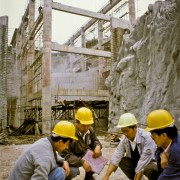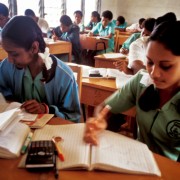Finance sector development
 Industry and trade
Industry and trade
 Social development and protection
Social development and protection
 Governance and public sector management
Governance and public sector management
 Industry and trade
Industry and trade
 Finance sector development
Regional cooperation and integration
Industry and trade
Governance and public sector management
Education
Finance sector development
Regional cooperation and integration
Industry and trade
Governance and public sector management
Education

What makes an effective international financial safety net?

The global financial crisis showed the need for a large-scale and effective international financial safety net (IFSN). Although East Asia has had a regional financial arrangement (RFA) since 2000 (the Chiang Mai Initiative1), it was not tapped during the global financial crisis for a variety of reasons. Our recent study examines the requirements for an effective IFSN. It should have adequate resources to deal with multiple crises, be capable of making a rapid and flexible response, and not be encumbered by historical impediments such as the IMF stigma that would limit its acceptance by recipient countries. Oversight of the IFSN needs to be based on cooperation between global and regional forums, for example, in the case of Asia, the G20 and ASEAN+3.
Dealing with the “noodle bowl” of Asia’s free trade agreements

East Asia’s attitude toward free trade agreements (FTAs) has changed. Slow progress in global trade talks has led to a surge in FTAs across Asia. With the World Trade Organization (WTO) Doha Round trade talks stalled, Asian countries see FTAs as a way of liberalizing trade and investment and sustaining economic recovery. The number of signed and implemented FTAs in the region has increased from three in 2000 to more than 60 in 2012, sparking concerns about an Asian “noodle bowl” of agreements. Critics worry about overlapping rules of origin (ROOs) requirements, which may be costly to business, especially small and medium-sized enterprises (SMEs), and argue that this wave of agreements will undermine the multilateral liberalisation process. A search for pragmatic and innovative ways to untangle the noodle bowl of Asia’s free trade agreements is needed.
Is Japanese aid ineffective?

Since 2003, the Center for Global Development (CGD), a Washington-based think tank, has been ranking the aid programs of the world’s richest countries using its commitment to development index (CDI). The CGD produces an index of donor performance, which measures “aid quantity and quality”. This index tracks net aid transfer as a share of gross domestic product (GDP), while penalizing tied aid and project “proliferation” and rewarding aid to poor but non-corrupt recipients (this is referred to as aid “selectivity”).
Asia in the 21st century: the challenge of good governance

The concept of good governance has many aspects. I will focus on two here: corruption and the rule of law. All Asians aspire to live in a society in which they do not have to offer a bribe to anyone in order to obtain what they are entitled to under the law. They want to live in a society in which the policeman, prosecutor and judge are not corrupt. They want to live in a society in which licences and contracts are granted and policies are made in a transparent manner and based on merit and nothing else. Corruption is a cancer eating at the heart of Asia. It is one of the most shameful of Asia’s failings.
Moving the Trans-Pacific Partnership forward: what will it take?

The formation of a Free Trade Area of the Asia–Pacific (FTAAP) has been intensively discussed in recent years. However, it is anticipated that such an Asia-Pacific Economic Cooperation (APEC)-wide FTA would take many years to negotiate and involve numerous studies among all the APEC members, currently 21 in number. The Trans-Pacific Partnership (TPP) could be a viable alternative. It is intended to be a “high-quality, comprehensive 21st century FTA” that will promote economic integration in the Asia-Pacific region. In addition to deep commitments to tariff reductions, it aims to cover services trade, investment, intellectual property, government procurement, competition policy, labor, the environment, and many other issues affecting trade and investment.
East Asia can learn from Europe’s mistakes
The current European crisis has highlighted the policy mistakes that were made in the process of European financial and monetary integration. It has exposed major deficits in the eurozone’s institutional framework, including insufficient macroeconomic policy coordination and the lack of a crisis response mechanism (which then had to be negotiated in the midst of crisis). One of the major failures that led to the current European predicament was that national and European policymakers allowed the build-up of huge macroeconomic imbalances within the eurozone. Wages and prices in southern “periphery” countries (with Ireland being an honorary member of the south) rose much more quickly than in the northern “core” countries such as Germany. The resulting loss of economic competitiveness of the periphery countries has led to a growth crisis that fed into a sovereign debt crisis after government finances were severely strained during the global financial crisis.
Does the Eurasian Union have a future?
On 3 October 2011, Russian Prime Minister Vladimir Putin proposed the establishment of a Eurasian Union in an article published in the Russian broadsheet Izvestia. The article was entitled “New integration project for Eurasia – making the future today.”
How the Philippines benefits from Australia’s booming links with the PRC
East Asia’s substantially market-led economic integration is a very complex process and is leading to some surprising effects. One example is that of Australia’s booming trade and investment with the People’s Republic of China (PRC), which is pushing up the value of the Australian dollar, and consequently enticing Australian companies to outsource business processing services to the Philippines. Over the past decade, Australia has enjoyed one of the best economic performances of any OECD country. While many structural reforms over the past few decades and sound macroeconomic management have underpinned this, Australia’s closer relationship with the PRC has also played a major role.
Asia in the 21st century: the challenge of equality
Eighteen years ago, the World Bank published a landmark book, The East Asian Miracle. The report praised eight Asian economies for their rapid and sustained economic progress and highlighted the fact that they seemed to have evolved a model which combined growth with equity. What is the situation today? Today we have growth, but with much less equity. All our societies have grown more unequal, as measured by the gini coefficient and the ratio of average incomes of the top 20% and the bottom 20%. According to the World Bank’s latest statistics, the gini coefficient for Singapore was 0.48 in 2010. In the case of the People’s Republic of China (PRC), the gini coefficient has risen from around 0.30 in the early 1980s to around 0.47 in 2009. Some social scientists have warned that inequality which exceeds the gini coefficient of 0.4 could lead to social unrest. Even without social unrest, great inequality is a threat to social cohesion and harmony. The current trend in Asia is fundamentally objectionable because it is inconsistent with the very purpose of development which is to benefit all citizens. ADB is, therefore, right to make inclusive growth one of its three agendas in its Strategy 2020 document.
Reforming Asia’s Trade in Services will Help Human Development

The services sector is becoming increasingly important in modern economies. In many of the most developed economies, it can represent two–thirds or even three–quarters of all economic activity. Even in developing economies, the services sector often accounts for a significant share of economic output and employment. International trade in services is also increasing in importance, and has been growing more rapidly than goods trade over recent years. It has also proven to be more resilient to the global financial crisis and resulting trade collapse. It has long been recognized that services trade can influence economic and social outcomes through a variety of mechanisms.


Search
Subscribe / Connect to Asia Pathways
Subjects
- Agriculture and natural resources
- Blog
- Capacity development
- Climate change
- Economics
- Education
- Energy
- Environment
- Finance sector development
- Gender
- Governance and public sector management
- Health
- Industry and trade
- Information and Communications Technology
- Infrastructure
- Miscellaneous
- Population
- Poverty
- Private sector development
- Regional cooperation and integration
- Sanitation
- Social development and protection
- Transport
- Uncategorized
- Urban development
- Video Blog
- Water
Recent Posts
- Transforming ASEAN: Advancing Regional Integration, Social Inclusion, and Environmental Sustainability
- Development of the Creative Economy in Asia and the Pacific
- Kashima City’s Great Transformation: Where Industry Meets Community
- Mechanization Driving the Future of Agriculture in Asia
- Natural Capital: Valuing Nature to Protect and Restore Ecosystem Services for Sustainable Development




Recent Comments